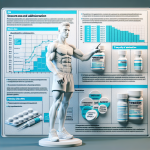-
Table of Contents
ECA Side Effects in Sports
Sports pharmacology is a rapidly growing field that aims to enhance athletic performance through the use of various substances. One of the most commonly used substances in sports is the ECA stack, which consists of ephedrine, caffeine, and aspirin. This combination has been shown to improve endurance, strength, and focus, making it a popular choice among athletes. However, like any other substance, the ECA stack also has its side effects, which can have a significant impact on an athlete’s health and performance. In this article, we will explore the potential side effects of the ECA stack in sports and how they can be managed.
Ephedrine
Ephedrine is a stimulant that is commonly used in the ECA stack due to its ability to increase energy and focus. It works by stimulating the central nervous system, leading to increased heart rate and blood pressure. While this can be beneficial for athletes, it can also have adverse effects on the body.
One of the most common side effects of ephedrine is increased blood pressure, which can be dangerous for individuals with pre-existing heart conditions. Studies have shown that ephedrine can cause a significant increase in both systolic and diastolic blood pressure, which can lead to cardiovascular problems (Haller et al. 2000). This is especially concerning for athletes who engage in high-intensity activities, as their heart rate and blood pressure are already elevated during exercise.
Ephedrine can also cause vasoconstriction, which is the narrowing of blood vessels. This can lead to reduced blood flow to vital organs, such as the heart and brain, which can be dangerous for athletes. In extreme cases, this can even lead to heart attacks or strokes (Shekelle et al. 2003).
Another potential side effect of ephedrine is insomnia. As a stimulant, it can disrupt the body’s natural sleep cycle, making it difficult for athletes to get adequate rest and recovery. This can have a negative impact on their performance and overall health.
Caffeine
Caffeine is a well-known stimulant that is found in many beverages and supplements. It is also a key component of the ECA stack, as it can enhance energy, focus, and endurance. However, like ephedrine, caffeine also has its side effects that athletes should be aware of.
One of the most common side effects of caffeine is increased heart rate and blood pressure. This can be especially concerning for athletes who already have elevated heart rate and blood pressure during exercise. Studies have shown that caffeine can cause a significant increase in both systolic and diastolic blood pressure, similar to ephedrine (Shekelle et al. 2003).
Caffeine can also have a diuretic effect, meaning it can increase the production of urine. This can lead to dehydration, which can have a negative impact on an athlete’s performance and health. Dehydration can cause fatigue, dizziness, and even heat stroke, which can be dangerous for athletes (Ganio et al. 2009).
Another potential side effect of caffeine is gastrointestinal distress. This can include symptoms such as nausea, vomiting, and diarrhea, which can be uncomfortable and disruptive for athletes during training or competition. This is especially common when caffeine is consumed in high doses or on an empty stomach.
Aspirin
Aspirin is a non-steroidal anti-inflammatory drug (NSAID) that is commonly used to reduce pain and inflammation. It is also a key component of the ECA stack, as it can enhance the effects of ephedrine and caffeine. However, aspirin also has its own set of side effects that athletes should be aware of.
One of the most common side effects of aspirin is gastrointestinal irritation. This can include symptoms such as stomach pain, nausea, and heartburn. This is because aspirin can irritate the lining of the stomach, leading to inflammation and discomfort (Lanas et al. 2007).
Aspirin can also increase the risk of bleeding, as it inhibits the production of blood-clotting cells. This can be dangerous for athletes who engage in contact sports or activities that may result in injuries. It is important for athletes to be cautious when taking aspirin and to avoid it if they have a bleeding disorder or are taking other medications that can increase the risk of bleeding.
Another potential side effect of aspirin is tinnitus, which is a ringing or buzzing sound in the ears. This is a rare side effect, but it can be bothersome for athletes, especially during training or competition.
Managing ECA Side Effects
While the ECA stack can provide significant benefits for athletes, it is essential to be aware of its potential side effects and take steps to manage them. Here are some tips for managing ECA side effects:
- Start with a low dose: It is important to start with a low dose of the ECA stack and gradually increase it if needed. This can help minimize the risk of side effects.
- Stay hydrated: As mentioned earlier, caffeine can have a diuretic effect, so it is crucial to stay hydrated when using the ECA stack. Make sure to drink plenty of water throughout the day.
- Monitor blood pressure: Athletes should regularly monitor their blood pressure when using the ECA stack, especially if they have pre-existing heart conditions. If their blood pressure becomes too high, they should stop using the ECA stack and consult a healthcare professional.
- Take breaks: It is essential to take breaks from using the ECA stack to give the body time to recover. This can help prevent tolerance and reduce the risk of side effects.
- Consult a healthcare professional: Athletes should always consult a healthcare professional before using the ECA stack, especially if they have any pre-existing medical conditions or are taking other medications.
Expert Comments
The ECA stack can provide significant benefits for athletes, but it is crucial to be aware of its potential side effects and take steps to manage them. As with any substance, it is essential to use the ECA stack responsibly and under the guidance of a healthcare professional. Athletes should also prioritize their overall health and well-being, and not solely focus on performance enhancement. With proper caution and management, the ECA stack can be a valuable tool for athletes looking to improve their athletic performance.
References
Ganio, M. S., Armstrong, L. E., Casa, D. J., McDermott, B. P., Lee, E. C., Yamamoto, L. M., … & Maresh, C. M. (2009). Mild dehydration impairs cognitive performance and mood of men. British Journal of Nutrition, 106(10), 1535-1543


